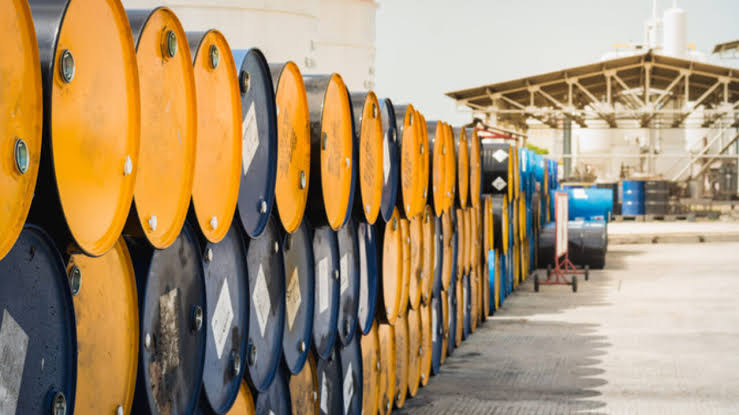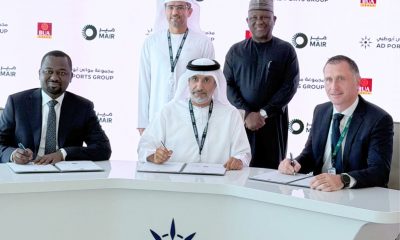Business
Unmasking the Maltese Cross of Corruption* By Arnold Owie

*Unmasking the Maltese Cross of Corruption*
By Arnold Owie
A national scandal has unfolded with the revelation of substandard petroleum products being imported into Nigeria, linked to a shadowy oil blending plant in Malta. Leaked documents and interviews expose a complex web of corruption involving NNPC personnel, oil traders, and terminal operators. Matrix Energy, owned by Abdulkabir Adisa Aliu, a member of the Presidential Economic Coordination Council (PECC), is at the center of this scandal. The company has been importing low-grade petroleum products from Russia, blending them in Malta, and selling them in Nigeria.
Aliu’s actions demonstrate a disregard for the Nigerian people’s welfare. Matrix Energy’s logistical infrastructure suggests a deliberate attempt to undermine local refinery efforts, ensuring continued importation of inferior fuel products. The allegations against Aliu are severe, including securing preferential access to crude oil cargoes and trading them through a UAE-based entity.
The Malta saga is a damning indictment of the entire system, with Farouk Ahmed and Mele Kyari facing scrutiny for their alleged complicity. The NNPC’s failure to curb substandard fuel imports is a testament to its incompetence or complicity, betraying public trust and national pride.
The exposé’s severity is heightened by Russia’s expulsion from the SWIFT global banking network, making oil and gas dealings between Nigerian entities and Russian refineries illicit. Shipping data reveals a disturbing trend: 15,000 tons of petroleum products were transloaded onto the ‘Matrix Triumph’ vessel on June 16 and discharged at Matrix Jetty in Warri on June 21 without rectification, implying toxic diesel is being sold to unsuspecting Nigerian consumers.
The House of Representatives’ visit to the Dangote Refinery on July 20, 2024, confirmed Matrix Energy’s importation of subpar diesel. Diesel samples from Matrix filling stations had a sulphur content exceeding 2,653ppm, far surpassing the 50ppm requirement. Aliko Dangote presented findings from an exhaustive analysis of diesel samples, revealing alarming sulphur content levels. The testing, conducted at Dangote Refinery’s state-of-the-art laboratories, employed precise protocols to measure total sulfur content in petroleum products.
Dangote revealed that the diesel samples were purchased in the presence of lawmakers, ensuring transparency and accountability. The test results showed that his refinery’s diesel boasted an exemplary quality, with a sulfur content of 600-650 ppm initially, and a remarkable 87 ppm currently. In stark contrast, the samples from TotalEnergies and Matrix Retail exhibited alarmingly high sulfur concentrations of 1,829ppm and 2,653ppm, respectively.
These findings corroborate the disturbing fact that certain companies have been peddling diesel with sulfur levels exceeding 2,000 parts per million, indicative of off-spec, adulterated products sourced from Russian refineries and purportedly “corrected” at blending plants in Malta and Lome. However, instead of rectifying the subpar fuel, a large-scale adulteration scheme was perpetrated, thereby posing grave dangers to the lives of consumers.
A report by Stakeholder Democracy Network (SDN), a non-governmental not-for-profit organization, said it appears to be easy for sub-standard fuel imports to enter Nigeria. “So it is probable that large volumes of fuel consumed are of poor quality, causing significant damage to public health, engines, and the environment. “This contributes to air quality levels that cut life expectancy by 4.7 years in the Niger Delta, the worst hit area across the African continent,” SDN said in its report.
The diesel produced locally in Nigeria is of a significantly higher quality than the fuel blended in Malta. This fact alone underscores the criminal nature of this operation. By importing inferior fuel, these unscrupulous individuals are not only defrauding the Nigerian government but also endangering the lives of millions of Nigerians. The long-term damage to vehicles and other machinery caused by these substandard products is incalculable.
In contrast to the greed and avarice displayed by those involved in the Malta saga, the figure of Alhaji Aliko Dangote stands tall as a beacon of patriotism and entrepreneurial spirit. Dangote’s strong commitment to building a world-class refinery in Nigeria is a testament to his belief in the potential of his country. Despite facing numerous obstacles and setbacks, he has persevered in his efforts to create jobs and generate wealth for the Nigerian people. Dangote’s refinery represents a tangible solution to the perennial fuel crisis and a catalyst for economic growth.
It is no coincidence that those involved in the Malta saga are vehemently opposed to Dangote’s refinery project. Their business model relies on the continued importation of substandard fuel, a practice that would be rendered obsolete by the existence of a local refinery. The Maltese cross of corruption is a formidable obstacle, but Dangote’s determination, coupled with the support of the Nigerian people, can overcome it.
This despicable scandal necessitates a prompt and resolute response from the government, entailing a comprehensive and unbiased investigation to hold accountable those responsible for these reprehensible actions. A radical overhaul and restructuring of the NNPC is imperative to prevent the recurrence of such abuses of power and ensure transparency. Moreover, the government must foster a conducive environment, conducive to the growth and prosperity of local refineries, thereby safeguarding our economy from the pernicious influence of saboteurs and revitalizing our oil and gas sectors with utmost haste.
Consequently, Male Kyari must be forthwith stripped of his position, while Adisa Aliu must be subjected to a meticulous and thorough investigation regarding his involvement in these sham dealings. The Nigerian populace deserves a government firmly committed to their welfare, and a petroleum sector distinguished by transparency, efficiency, and accountability.
The laxity in regulating fuel quality poses a grave and formidable health risk to the citizens of Nigeria, underscoring the imperative for a government that prioritizes their well-being. The Malta saga serves as a stark reminder of the formidable challenges confronting Nigeria, yet simultaneously presents an opportunity for transformative change. By unmasking the entrenched corruption and collusion that has long plagued the oil and gas sector, this scandal can catalyze a paradigm shift, heralding a new era of reform and accountability.
The Maltese saga Is a dark chapter in Nigeria’s history, but it can also be a turning point. By exposing the corruption and greed that have plagued the oil and gas sector, this scandal offers an opportunity to build a better future. A future where the nation’s resources are used for the benefit of its people, not the enrichment of a few.
Only by taking these steps can Nigeria hope to break free from the stranglehold of corruption and build a brighter future for its citizens.
Owie is an oil and gas expert writing from the United Kingdom.
Business
Nigeria’s Inflation Drops to 15.10% as NBS Reports Deflationary Trend

Nigeria’s headline inflation rate declined to 15.10 per cent in January 2026, marking a significant drop from 27.61 per cent recorded in January 2025, according to the latest Consumer Price Index (CPI) report released by the National Bureau of Statistics.
The report also showed that month-on-month inflation recorded a deflationary trend of –2.88 per cent, representing a 3.42 percentage-point decrease compared to December 2025. Analysts say the development signals easing price pressures across key sectors of the economy.
Food inflation stood at 8.89 per cent year-on-year, down from 29.63 per cent in January 2025. On a month-on-month basis, food prices declined by 6.02 per cent, reflecting lower costs in several staple commodities.
The data suggests a sustained downward trajectory in inflation over the past 12 months, pointing to improving macroeconomic stability.
The administration of President Bola Ahmed Tinubu has consistently attributed recent economic adjustments to ongoing fiscal and monetary reforms aimed at stabilising prices, boosting agricultural output, and strengthening domestic supply chains.
Economic analysts note that while the latest figures indicate progress, sustaining the downward trend will depend on continued policy discipline, exchange rate stability, and improvements in food production and distribution.
The January report provides one of the clearest indications yet that inflationary pressures, which surged in early 2025, may be moderating.
Bank
Alpha Morgan to Host 19th Economic Review Webinar

Alpha Morgan to Host 19th Economic Review Webinar
In an economy shaped by constant shifts, the edge often belongs to those with the right information.
On Wednesday, February 25, 2026, Alpha Morgan Bank will host the 19th edition of its Economic Review Webinar, a high-level thought leadership session designed to equip businesses, investors, and individuals with timely financial and economic insight.
The session, which will hold live on Zoom at 10:00am WAT and will feature economist Bismarck Rewane, who will examine the key signals influencing Nigeria’s economic direction in 2026, including policy trends, market movements, and global developments shaping the local landscape.
With a consistent track record of delivering clarity in uncertain times, the Alpha Morgan Economic Review continues to provide practical context for decision-making in a dynamic environment.
Registration for the 19th Alpha Morgan Economic Review is free and can be completed via https://bit.ly/registeramerseries19
It is a bi-monthly platform that is open to the public and is held virtually.
Visit www.alphamorganbank to know more.
Business
GTBank Launches Quick Airtime Loan at 2.95%

GTBank Launches Quick Airtime Loan at 2.95%
Guaranty Trust Bank Ltd (GTBank), the flagship banking franchise of GTCO Plc, Africa’s leading financial services group, today announced the launch of Quick Airtime Loan, an innovative digital solution that gives customers instant access to airtime when they run out of call credit and have limited funds in their bank accounts, ensuring customers can stay connected when it matters most.
In today’s always-on world, running out of airtime is more than a minor inconvenience. It can mean missed opportunities, disrupted plans, and lost connections, often at the very moment when funds are tight, and options are limited. Quick Airtime Loan was created to solve this problem, offering customers instant access to airtime on credit, directly from their bank. With Quick Airtime Loan, eligible GTBank customers can access from ₦100 and up to ₦10,000 by dialing *737*90#. Available across all major mobile networks in Nigeria, the service will soon expand to include data loans, further strengthening its proposition as a reliable on-demand platform.
For years, the airtime credit market has been dominated by Telcos, where charges for this service are at 15%. GTBank is now changing the narrative by offering a customer-centric, bank-led digital alternative priced at 2.95%. Built on transparency, convenience and affordability, Quick Airtime Loan has the potential to broaden access to airtime, deliver meaningful cost savings for millions of Nigerians, and redefine how financial services show up in everyday life, not just in banking moments.
Commenting on the product launch, Miriam Olusanya, Managing Director of Guaranty Trust Bank Ltd, said: “Quick Airtime Loan reflects GTBank’s continued focus on delivering digital solutions that are relevant, accessible, and built around real customer needs. The solution underscores the power of a connected financial ecosystem, combining GTBank’s digital reach and lending expertise with the capabilities of HabariPay to deliver a smooth, end-to-end experience. By leveraging unique strengths across the Group, we are able to accelerate innovation, strengthen execution, and deliver a more integrated customer experience across all our service channels.”
Importantly, Quick Airtime Loan highlights GTCO’s evolution as a fully diversified financial services group. Leveraging HabariPay’s Squad, the solution reinforces the Group’s ecosystem proposition by bringing together banking, payment technology, and digital channels to deliver intuitive, one-stop experiences for customers.
With this new product launch, Guaranty Trust Bank is extending its legacy of pioneering digital-first solutions that have redefined customer access to financial services across the industry, building on the proven strength of its widely adopted QuickCredit offering and the convenience of the Bank’s iconic *737# USSD Banking platform.
About Guaranty Trust Bank
Guaranty Trust Bank (GTBank) is the flagship banking franchise of GTCO Plc, a leading financial services group with a strong presence across Africa and the United Kingdom. The Bank is widely recognized for its leadership in digital banking, customer experience, and innovative financial solutions that deliver value to individuals, businesses, and communities.
About HabariPay
HabariPay is the payments fintech subsidiary of GTCO Plc, focused on enabling fast, secure, and accessible digital payments for individuals and businesses. By integrating payments and digital technology, HabariPay supports innovative services that make everyday financial interactions simpler and more seamless.
Enquiries:
GTCO
Group Corporate Communication
[email protected]
+234-1-2715227
www.gtcoplc.com
-

 celebrity radar - gossips6 months ago
celebrity radar - gossips6 months agoWhy Babangida’s Hilltop Home Became Nigeria’s Political “Mecca”
-

 society6 months ago
society6 months agoPower is a Loan, Not a Possession: The Sacred Duty of Planting People
-

 society5 months ago
society5 months agoReligion: Africa’s Oldest Weapon of Enslavement and the Forgotten Truth
-

 news6 months ago
news6 months agoTHE APPOINTMENT OF WASIU AYINDE BY THE FEDERAL GOVERNMENT AS AN AMBASSADOR SOUNDS EMBARRASSING









